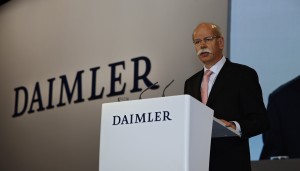
Cost cutting and efficiency programs in all divisions haven't stopped the multi-billion dollar losses.
The global automotive Great Recession could easily claim another high profile executive as the speculation intensifies in the German press that Daimler AG’s chief executive, Dieter Zetsche, is about to get the boot.
Daimler has it is share of challenges in recent months and looks to face more of the same in 2010 as Mercedes-Benz because of its expensive lineup gained little from CARs, aka cash for clunkers programs in the US, and similar programs across Europe.
Meanwhile, Daimler has spent billion on developing new diesel technology just as the world was shifting towards regulatory schemes and taxpayer subsidies favor hybrids and electric vehicles. The premium incurred by advanced diesel engines, as well as pricing issues in some markets make it all the more difficult to sell them to consumers.
In addition, one of Daimler’s principle partners in China, Beijing Auto, seems eager to build its very own automotive empire. Cooperation with BMW, which could benefit both companies, is going nowhere fast, largely because the Quandt family is loathe to give any quarter to its old rival.
In fact, the diffused ownership structure is one of Daimler’s principal vulnerabilities in today’s tumultuous automotive world. The company is at the mercy of fickle shareholders.
While German shareholder meetings tend to be long and tedious, they also have a dramatic element to them and at the Daimler shareholder’s meeting last spring in Berlin, it was evident that there were plenty of dissatisfied shareholders around critical of Zetsche’s conduct of the company’s affairs.
Zetsche probably made the right earlier this year when he arranged to sell a large block of stock to a group of Middle Eastern investors. However, the move riled Daimler’s smaller shareholders who viewed it, correctly, as a dilution of their own holdings.
Daimler’s small shareholders — and some fund managers as well — also view Zetsche as a protégé of the detested Juergen Schrempp, who they believe is enjoying a lavish retirement at their expense.
Fifty percent of top executives at German corporations have been replaced since 2006, according to the German news magazine Der Spiegel.
After taking over from Schrempp in 2006, Zetsche did manage to enjoy a brief respite when he sold Chrysler to Cerberus in August 2007. As it turned out Daimler had to sweeten the pot for Cerberus, and still being dragged into the litigation that surrounds the old Chrysler left behind in bankruptcy court
Daimler’s share priced soared after the Chrysler sale to Cerberus, but has fallen back to earth since then.
Then there is the great office fiasco in Stuggart
When Zetsche took over in 2006 he pulled the company’s headquarters out of its suburban compound in Mohringen and moved it back down the hill, literally, into Stuttgart and into the valley of the Isar river where the company begaan more than a century ago. For inspiration, the new/old headquarters close to where the Mercedes-Benz was just finishing its spectacular new museum.
However, the old office block wasn’t suitable for a modern headquarters so Daimler prepared plans to tear it down and replace it. Mercedes executive offices were moved again to temporary quarters in what was the old museum.
However, as the auto recession gathered steam, Daimler was forced to halt construction of the office block, leaving the executive offices in the old museum, which apparently has turned into hive for gossip and speculation.
“Wherever the company’s senior management goes, a fog of rumors always follows them. And at the moment it is billowing thicker than ever,” noted Der Spiegel.
“Zetsche is even allegedly due to be replaced soon — apparently by the current chairman of the supervisory board, Manfred Bischoff. And the more the managers whisper in backrooms, the more often they meet other colleagues who have already heard the rumor,” Der Spiegel notes.
Meanwhile, Mercedes-Benz sales have declined by almost 18%, while truck sales have plummeted by around a half. The company reported losses of $ 3.5 billion for the first six months of this year and more losses are expected.
Zetsche appears to have indifferent support on the company’s management board, which is probably why he found a job for his old sidekick from Auburn Hills, Wolfgang Bernhard.
Der Spiegel also suggests Zetsche still has not come up with an answer to the question of whether to survive if Mercedes-Benz needs a partner. “And how long can Daimler continue to compensate for the drop in sales by relying on government-sponsored “short time” programs which support workers on reduced hours? If sales don’t pick up soon, the company will have a surplus of 25,000 employees on the payroll, according to internal calculations. Will the carmaker have to close plants and lay off thousands of workers,” Der Spiegel said.
So far, Zetsche has avoided a confrontation with Daimler’s unions, which would easily set in motion a train of events that would lead to his own ouster.
